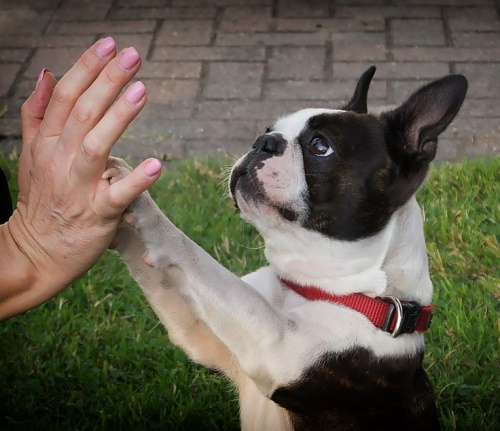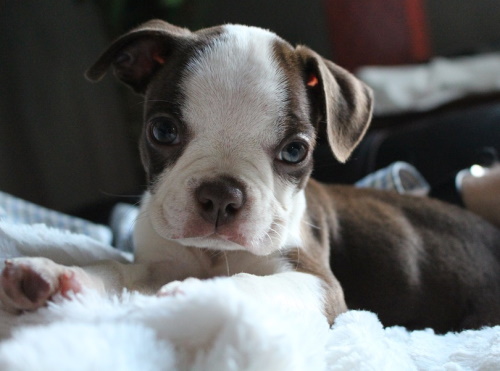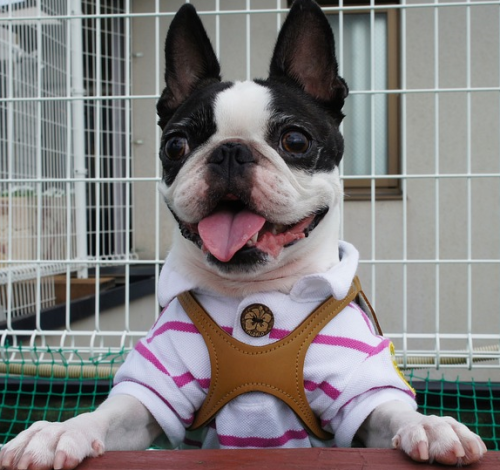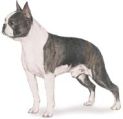Boston Terrier Dog -
Patient And Loving With Children!
Boston Terrier dogs were bred originally to be fighting dogs, but today's Boston is strictly bred to be a companion, and a fine one he is.

The all-American Boston Terrier, formerly known as the American Bull Terrier, originated
after the Civil War. He resulted from the crossbreeding of an English Bulldog and an English White Terrier, known
as Judge and Gyp and was named after the city of its roots.
During the breed's early development other terrier breeds were introduced to the mix, among them the
Boxer and the English Bulldog. Today's Boston is not only smaller, but also more mellower than his ancestors.
This breed gives the overall appearance of being well-balanced, strong, athletic, stylish and in good proportion. His
demeanor and expression convey intelligence and alertness. In dog shows, they are seen participating in conformation,
obedience, agility, flyball and rally.
Physical Stats And Care
There are three weight classes:
Light: up to 15 pounds
Medium: 15 pounds up to 20 pounds
Heavy: up to 25 pounds.
The height range is between 10 to 16 inches
Colors: The standard coat colors must be black, brindle or seal with white markings.
The coat is smooth in appearance and short-haired. Its texture is fine and and there is no undercoat. Boston Terrier dogs do shed, but this can be controlled with weekly brushing.
With large prominent eyes, it is very important to check the Boston's eyes daily for any signs of irritation or debris. Saline solution can be useful for flushing if needed.
In addition to brush work, a daily face
wipe, regular ear inspection and occasional nail clipping is needed.
A popular all-in-one grooming aide for this
breed is the
Pet Buddies
Dog Grooming Glove
.
 Sweet Puppy
Sweet PuppyCharacteristics of the Boston Terrier Dog
This charming and classy dog breed is very popular for his many excellent traits. First and foremost, he is a family oriented, devoted pet with a playful and very affectionate nature.
He has a gentle
disposition and a high level of intelligence. He'll warn you of a
stranger approaching your home, but he is not a nuisance barker.
There is one fairly common trait of the Boston that some may view as a downside. It is something fairly often
associated with short-muzzled dogs - and that is snoring.
Unfortunately, he does have a bad rap in
this department. In light of his many redeeming qualities, the majority of owners probably choose to overlook
this while giving him his own room to sleep in!! Or invest in a pair of ear plugs.
Dogs that are mainly bred for companionship, like the Boston, often fall into the hands of careless breeders.
For this reason buyers considering Boston Terrier dogs are advised to make sure they thoroughly check the breeder credentials before acquiring a dog.
Responsible breeders strive to keep the standard profile in tact.

Health Notes
There are quite a few health issues that may affect the Boston Terrier dog during his lifespan of 10 to 14 years. The most prominent ones center around his prominent eyes and include:
- cataracts,
- corneal ulcers, and
- glaucoma
In addition to eye problems, other health conditions to be aware include :
- Deafness
- Luxating patella
- Heart murmurs,
- Epilepsy,
- Allergic dermatitis
and, because Boston's have a short flat face, they are among the breeds that can have respiratory problems while playing or going for a walk during hot and humid weather, affecting their ability to breathe. This condition is also referred to as Brachycephalic Syndrome.
Those seeking a puppy should expect the breeder to provide a full health profile of the puppy and its parents. The Boston Terrier Club of American encourages responsible breeders to have these health test completed:
Patella Evaluation
Ophthalmologist Evaluation
BAER Testing
If the results of tests are registered, this will provide more health information to add to the knowledge base and be helpful to future breeders.
Training the Boston Terrier
Boston terrier training can be a bit tricky if families fall into a common trap of letting the Boston take over as the boss!
Because this
dog is so lovable, it is easy to let him take charge of the household.
If this happens, behavior problems will likely not be far behind.
Boston Terrier dogs thrive on human interaction, but they also need direction - as in a leader.
Owners who take over the leadership and train their pet with gentle, positive methods will find them very responsive to direction, eager to please and quick learners.
Activity Level of the Breed
Boston Terrier dogs are pretty active around the house, but they still need a modest daily walk. This breed does not do well in extreme weather conditions.
For this reason, it is best to choose the coolest time of days for walks when the weather is hot. During cold weather, consider investing in a coat for your Boston.

Ideal Living Space
Apart from the necessary walks and potty breaks, the Boston Terrier dog is basically an inside pet.
While he prefers to live in climates that are not extreme, he easily adapts to either a house or apartment, city or country living.
Families With Children?
Boston Terrier has an excellent reputation with considerate children and will patiently join in their games, but play should be supervised at all times by an adult.
Why? Because both children and dogs are
unpredictable!
Senior Or Less Active Families
Boston Terriers have often been used in therapy work. Their loving nature, sensitivity toward seniors makes them ideal pets for seniors or the less active families. An added plus is that their grooming needs are easily managed.
However, daily walks are still necessary for their mental and physical well-being.
Share Your Knowledge And Dog Pictures
Do you have a Boston Terrier? If you do, we know you must be proud to own this treasured dog breed.
We would love for you to share your dog's pictures and his story as well as your knowledge about the breed in general.
You can upload photos and tell your dog's story here.
For inspiration, read some of the stories about various breeds already submitted by other dog lovers.
Further Reading

The Boston Terrie
An Owner's Guide to a Happy Healthy Pet
Expert information covering care, grooming, training, health, nutrition, and potential disorders that may concern the breed. Also included are fun facts and activities.
Images Courtesy Pixabay.com


